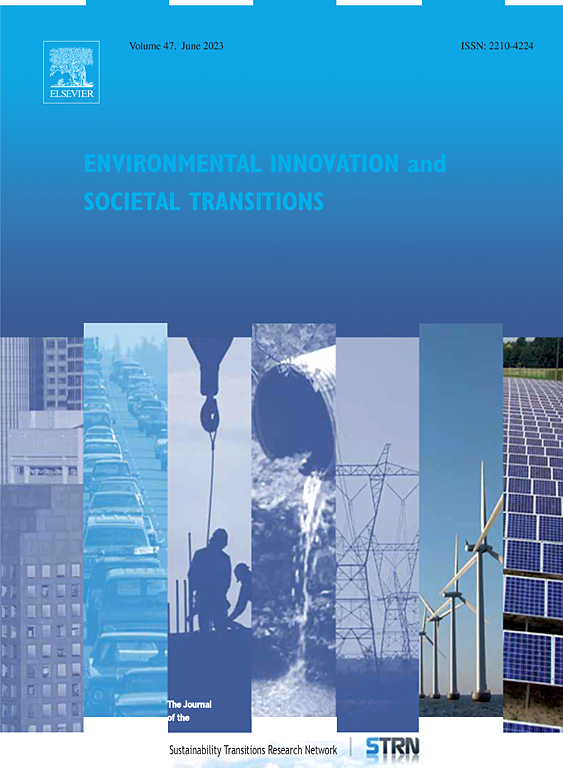Steaming ahead while also losing pressure? Examining the roles of the state in Kenya’s geothermal energy transition
IF 5.7
2区 经济学
Q1 ENVIRONMENTAL SCIENCES
Environmental Innovation and Societal Transitions
Pub Date : 2025-06-16
DOI:10.1016/j.eist.2025.101008
引用次数: 0
Abstract
This paper aligns with, and seeks to build on, literature which has called for more sophisticated, dynamic conceptions of ‘the state’ in sustainability transitions research. Specifically, the paper echoes scholars who have argued that relational state theory can offer a useful approach for understanding the complex, often contradictory roles that states play in shaping sustainability transitions. The paper demonstrates its utility through the case of Kenya’s geothermal energy transition. Since the early-2000s, geothermal has displaced hydro and thermal power as Kenya’s biggest source of electricity and, today, Kenya ranks seventh amongst geothermal power producers worldwide. Mainstream accounts often appear to locate Kenya’s geothermal ‘success’ in the adoption of institutional arrangements that have promoted private investment and restricted the state’s presence. Where the state is recognised, it is often seemingly for dutifully performing the functions of a ‘de-risking state’. Critical academic literature identifies a more expansive role for the state. However, it, too, underplays various ways in which the Kenyan state – and balance of social forces underpinning it – has shaped geothermal developments. A relational approach, by contrast, uncovers a fuller, more extensive role for state actors in Kenya’s geothermal transition. It also yields a more complicated, nuanced account in which state actors have not always supported geothermal expansion and, in some respects, have actively forestalled it, through combinations of intra-state turf wars, flawed planning processes and personalistic rent-seeking.
在失去压力的同时继续前进?考察国家在肯尼亚地热能转型中的作用
本文与文献保持一致,并寻求建立在文献的基础上,这些文献呼吁在可持续性转型研究中使用更复杂、更动态的“国家”概念。具体来说,这篇论文回应了一些学者的观点,他们认为关系状态理论可以提供一种有用的方法来理解国家在塑造可持续性转型中所扮演的复杂的、经常相互矛盾的角色。本文以肯尼亚地热能转型为例,论证了其效用。自21世纪初以来,地热已经取代水力和火力发电成为肯尼亚最大的电力来源,如今,肯尼亚在全球地热发电中排名第七。主流报道似乎经常将肯尼亚地热的“成功”定位于采用了促进私人投资和限制国家存在的制度安排。在国家得到认可的地方,它通常看起来是尽职尽责地履行“去风险国家”的职能。批判性的学术文献认为,国家应该扮演更广泛的角色。然而,它也低估了肯尼亚国家——以及支撑它的社会力量的平衡——塑造地热开发的各种方式。相比之下,关系方法揭示了国家行为体在肯尼亚地热转型中的更全面、更广泛的作用。它还提供了一个更复杂、更微妙的解释,即国家行为者并不总是支持地热扩张,而且在某些方面,通过州内地盘之争、有缺陷的规划过程和个人寻租的结合,积极地阻止了地热扩张。
本文章由计算机程序翻译,如有差异,请以英文原文为准。
求助全文
约1分钟内获得全文
求助全文
来源期刊

Environmental Innovation and Societal Transitions
Energy-Renewable Energy, Sustainability and the Environment
CiteScore
13.60
自引率
19.40%
发文量
90
审稿时长
56 days
期刊介绍:
Environmental Innovation and Societal Transitions serves as a platform for reporting studies on innovations and socio-economic transitions aimed at fostering an environmentally sustainable economy, thereby addressing structural resource scarcity and environmental challenges, particularly those associated with fossil energy use and climate change. The journal focuses on various forms of innovation, including technological, organizational, economic, institutional, and political, as well as economy-wide and sectoral changes in areas such as energy, transport, agriculture, and water management. It endeavors to tackle complex questions concerning social, economic, behavioral-psychological, and political barriers and opportunities, along with their intricate interactions. With a multidisciplinary approach and methodological openness, the journal welcomes contributions from a wide array of disciplines within the social, environmental, and innovation sciences.
 求助内容:
求助内容: 应助结果提醒方式:
应助结果提醒方式:


